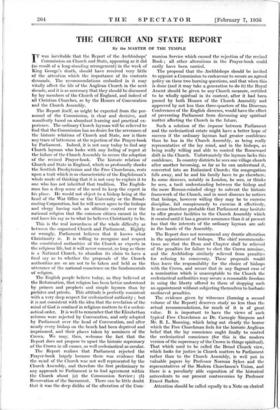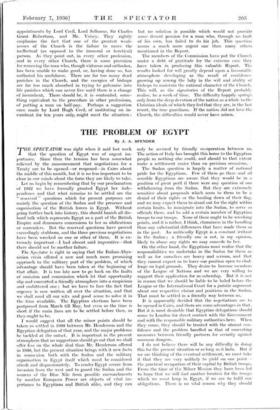THE CHURCH AND STATE REPORT
By the MASTER OF THE TEMPLE IT was inevitable that the Report of the Archbishops' Commission on Church and State, appearing as it did (as result of a long-standing arrangement) in the week of King George's death, should have received very little of the attention which the importance of its contents demands. The recommendations embodied in it may vitally affect the life of the Anglican Church in the next decade, and it is as necessary that they should be discussed by lay members of the Church of England, and indeed of all Christian Churches, as by the Houses of Convocation and the Church Assembly.
The Report itself, as might be expected from the per- sonnel of the Commission, is clear and decisive, and manifestly based on abundant learning and practical ex- perience. The ordinary Church layman will be relieved to find that the Commission has no desire for the severance of the historic relations of Church and State, nor is there any trace of bitterness at the rejection of the Prayer-book.
by Parliament. Indeed, it is not easy today to find any Church layman who looks with any feeling of regret at the failure of the-Church Assembly to secure the adoption of the revised Prayer-book. The historic relation • of Church and State in England, which so profoundly shocks the Scottish Presbyterian and the Free Churchman, rests upon a trait which is so characteristic of the Englishman's whole mode of thinking that it is not easy to explain it to one who has not inherited that tradition. The English- man has a deep sense of the need to keep the expert in his place. He would not object to a bishop being at the head of the War Office or the University or the Broad- casting Corporation, but he will never agree to the bishops and clergy having such an ultimate control over the national religion that the common citizen cannot in the end have his say as to what he believes Christianity to be. This is the real inwardness of the whole difficulty as between the organised- Church and Parliament. Rightly or wrongly, Parliament believes that it knows what Christianity is. It is willing to recognise and respect the constituted authorities of the Church as experts in the religious life, but it will never consent, so long as there is a National Church, to abandon its claim to have a final say as to whether the proposals of the Church authorities are or are not to be taken and held as the utterance of the national conscience on the fundamentals of religion.
The English people believe today, as they believed at the Reformation, that religion has been better understood by princes and prophets and simple laymen than by prelates and priests. This attitude is perfectly consistent with a very deep respect for ecclesiastical authority ; but it is not consistent with the idea that the revelation of the mind of God is confined in religious matters to tie ecclesi- astical order.. It is well to remember that the Elizabethan reforms were rejected by Convocation, and only adopted by Parliament over the head of Convocation, and after nearly every bishop on the bench had been deprived and imprisoned, and their places taken by nominees of the Crown. We may, then, welcome the fact that the Report does not propose to upset the historic supremacy of the Crown in all causes, as well ecclesiastical as secular.
The Report realises that Parliament rejected the Prayer-book largely because there was evidence that the mind of the Church was not well represented by the Church Assembly, and therefore the first preliminary to any approach to Parliament is to find agreement within the Church about (a) the Communion Service; (b) Reservation of the Sacrament. There can be little doubt that it was the deep dislike of the alteration of the Corn- munion Service which caused the rejection of the revised Book ; all other alterations in the Prayer-book could easily have been carried.
The proposal that the Archbishops should be invited to appoint a Commission to endeavour to secure an agreed policy on these two burning questions, and that when this is done (and it may take a generation to do it) the Royal Assent should be given to any Church measure, certified to be wholly spiritual in its content, after it had been passed by both Houses of the Church Assembly and approved by not less than three-quarters of the Diocesan Conferences of the English dioceses, would have the effect of preventing Parliament from discussing any spiritual matter affecting the Church in the future.
Such a solution of the impasse between Parliament and the ecclesiastical estate might have a better hope of success if the ordinary layman had greater confidence than he has in the Church Assembly, as being really representative of the lay mind, and in the bishops, as being really willing and able to control the Homeward drift in the Church. Unfortunately the layman lacks this confidence. In country districts he sees one village church after another becoming, so far as he can understand it, converted into an Italianized Church ; the congregation falls away, and he and his family have to go elsewhere. In some dioceses, notably in London, he sees, or thinks he sees, a tacit understanding between the bishop and the more Roman-minded clergy to subvert the historic framework of the Church, and in most dioceses he notices that bishops, however willing they may be to exercise discipline, fail conspicuously to exercise it effectively. It seems therefore probable that Parliament may hesitate to offer greater facilities to the Church Assembly which it created until it has a greater assurance than it at present has that the interests of the ordinary layman are safe in the hands of the Assembly.
The Report does not recommend any drastic alteration in the appointment of bishops. The chief recommenda- tions are that the Dean and Chapter shall be relieved of the penalties for failure to elect the Crown nominee, and the Archbishop similarly relieved from penalties for refusing to consecrate. These proposals would thus leave the responsibility for the choice of bishops with the Crown, and secure that in any flagrant case of a nomination which is unacceptable to the Church the ecclesiastical authorities may secure a reasonable freedom in using the liberty offered to them of stopping such an appointment without subjecting themselves to barbaric mediaeval penalties.
The evidence given by witnesses (forming a second volume of the Report) deserves study no less than the actual recommendations, for much of it is of great value. It is important to have the views of such typical Free Churchmen as Dr. Carnegie Simpson and Mr. B. L. Manning, which bring out clearly the horror which the Free Churchman feels for the historic Anglican belief that the lay conscience ought finally to control the ecclesiastical conscience (for this is the modern version of the supremacy of the Crown in things spiritual). That which used to be called the Broad Church view, which looks for justice in Church matters to Parliament rather than to the Church Assembly, is well put in valuable papers by Professor Norman Sykes . and the representatives of the Modern Churchmen's Union, and there is a peculiarly able exposition of the historical antecedents to our present controversies by Professor Ernest Barker.
Attention should be called equally to a Note on clerical appointments by Lord Cecil, Lord Selborne, Sir Charles Grant Robertson, and Mr. Vaisey. They . rightly emphasise the fact that one of the greatest weak- nesses of the Church is the failure to .move the ineffectual (as opposed to the immoral or heretical) parson. As they point out, in every • other profession, and in . every other Church, there is , some . provision for removing the man who, though virtuous and orthodox, has been unable to make good, or, having .done so, has outlasted his usefulness. There are far too many dead parishes in the Church, and the energies of bishops are far too much absorbed in trying to galvanise into life parishes which can never live until there is a change of incumbent. There should-be, it is- contended, some- thing equivalent to the procedure in. other professions, of putting a man on half-pay. Perhaps a suggestion once made by Lord Hugh Cecil, of instituting an in- cumbent for ten years only, might meet the situation : but no solution is possible which would not provide some decent pension for a man who, through no fault of his own, has failed to do his job. This question seems a much more urgent one than many others mentioned in the Report.
The members of the Commission have put the Church under a debt of gratitude for the extreme care they ,have taken in producing this valuable 'Report. The results looked for will greatly depend upon a favourable atmosphere developing as the result of confidence growing up among the laity in the will and ability of bishops to maintain the national character of the Church. This will, as the signatories of the Report probably .realise, be a work of time. The difficulty happily springs : only from the deep devotion of the nation as a whole to the Christian ideals of which they feel that they are, in the last resort, the true guardians. If the nation did not love the Church, the difficulties would never have arisen.















































 Previous page
Previous page